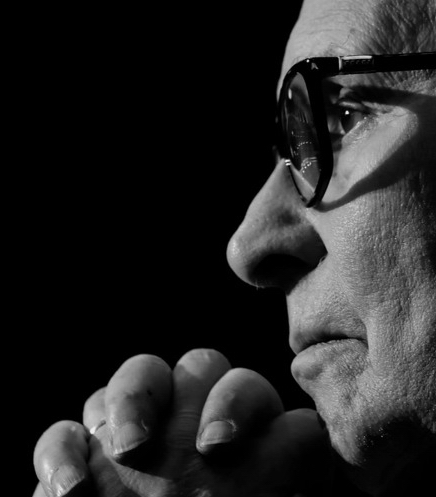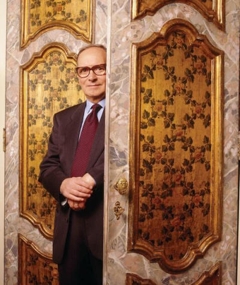| Ennio Morricone
 |
Date of Birth
10 November 1928, Rome, Italy
Date of death
6 July 2020, Campus Bio Medico University of Rome, Selcetta, Italien
Ennio Morricone (10th. November 1928 – 6th. July 2020)
With his peerless versatility and productivity, Ennio Morricone has been one of the most famous and influential film composers since the 1960s.
Drawing from classical, jazz, rock, Italian folk, and avant-garde influences, Morricone’s 400-plus scores have accompanied every conceivable movie genre;
his innovative soundscapes for Sergio Leone’s 1960s Westerns, however, were enough to ensure his lasting reputation.
“I was offered a free villa in Hollywood, but I said no thank you, I prefer to live in Italy.”
His list of directorial collaborators a veritable Who’s Who of post-1960 international cinema, Morricone’s music has masterfully accompanied the films of most notably Leone, Bernardo Bertolucci, Pier Paolo Pasolini, Giuseppe Tornatore, Roland Joffe, Brian De Palma, and Warren Beatty.
A lifelong Rome resident and classically trained musician, Morricone began studying at the Conservatory of Santa Cecilia at age 12.
Advised to study composition, Morricone also specialized in playing trumpet and supported himself by playing in a jazz band and working as an arranger for Italian radio and TV after he graduated.
Morricone subsequently became a top studio arranger at RCA, working with such stars as Mario Lanza, Chet Baker, and the Beatles.
Well-versed in a variety of musical idioms from his RCA experience, Morricone began composing film scores in the early ‘60s. Though his first films were undistinguished, Morricone’s arrangement of an American folk song intrigued director (and former schoolmate) Sergio Leone.
Leone hired Morricone and together they created a distinctive score to accompany Leone’s different version of the Western, A Fistful of Dollars (1964).

Rather than orchestral arrangements of Western standards à la John Ford — budget strictures limited Morricone’s access to a full orchestra regardless — Morricone used gunshots, cracking whips, voices, Sicilian folk instruments, trumpets, and the new Fender electric guitar to punctuate and comically tweak the action, cluing in the audience to the taciturn man’s ironic stance. Though sonically bizarre for a movie score, Morricone’s music was viscerally true to Leone’s vision.
As memorable as Leone’s close-ups, harsh violence, and black comedy, Morricone’s work helped to expand the musical possibilities of film scoring. Though he was initially billed on Fistful as Dan Savio, Morricone’s name became almost as well-known as Leone’s when his more ambitious score for The Good, the Bad and the Ugly (1966) yielded a Top Ten hit (despite his avowed disdain for pop music soundtracks).
Even more so than in the first two Dollars films, Morricone’s scores for The Good, the Bad and the Ugly and Leone’s epic Once Upon a Time in the West (1968) elevated the action to operatic heights.
Reaching crescendos in The Good’s famous graveyard shootout and West’s showdown between Charles Bronson’s Harmonica and Henry Fonda’s Frank Booth, Morricone and Leone created set pieces that were as powerful musically as visually, placing music on a par with the image rather than subordinating it.
Integrating a spectral harmonica into the theme music for Booth as well as Harmonica, the soundtrack hints at their fateful relationship long before the truth is visually revealed.
Morricone’s scores were so integral to Leone’s Westerns that he had Morricone write and record Once Upon a Time in the West’s main themes, and then played them during shooting so that the actors could move to the score’s rhythms.
Morricone and Leone repeated this for their equally effective collaboration on the gangster saga Once Upon a Time in America (1984).
Even as he was permanently changing the landscape of Western scores, the breadth of Morricone’s talent became apparent as he took on more overtly “art” film projects. Morricone’s music lent drama to Gillo Pontecorvo’s highly regarded, documentary-style war film The Battle of Algiers (1966); that of Algiers and his score for Pontecorvo’s Queimada! (1969) were two of Morricone’s outstanding, non-Leone 1960s works.
Morricone also delved into the remnants of Italian cinema’s postwar heritage with Marco Bellochio’s unsung, late neorealist film Fist in His Pocket (1965), Bernardo Bertolucci’s neo-neorealist second film Before the Revolution (1964), and Pier Paolo Pasolini’s parable/farewell to that legacy, Hawks and Sparrows (1966). Keeping pace with Bertolucci’s and Pasolini’s evolving styles and concerns, Morricone continued to collaborate with the directors into the 1970s.
From the Godard-ian Partner (1968) to the coming of age story Luna (1979) and hostage drama Tragedy of a Ridiculous Man (1980), Morricone enhanced the emotion and drama of Bertolucci’s increasingly stylized (and occasionally muddled) imagery, reaching an apex with the somber, grand, and celebratory compositions for Bertolucci’s epic 1900 (1976).
Morricone’s lavish scores for Pasolini’s sexy, satirical “Trilogy of Life,” The Decameron (1970), The Canterbury Tales (1971), The Arabian Nights (1974), and his notorious final film Salo, or the 120 Days of Sodom (1975), were one of the few aspects of the films not to provoke controversy.
Staying close to his genre film roots even as he advanced in art cinema, Morricone provided psychedelic accompaniment for Mario Bava’s superhero romp Danger: Diabolik (1968), and crafted a series of evocative scores for Dario Argento’s stylized thrillers, including The Bird With the Crystal Plumage (1969), The Cat O’Nine Tails (1971), and Four Flies on Grey Velvet (1974).
Enhancing his international reputation from the 1970s onward, Morricone continued to compose for movies across the artistic spectrum as well as collaborating with an international constellation of directors and stars.
Beginning with The Burglars (1971), Morricone devised straight-up action scores for several Jean-Paul Belmondo star vehicles, including Le Professionel (1981); his music also graced the wildly popular French transvestite comedy La Cage Aux Folles (1978) and its sequels.
Hired by Don Siegel to give his ironic edge to the Clint Eastwood Western Two Mules for Sister Sara (1970), Morricone made his presence felt in American films in the late ‘70s with his eerie, pulsating music for the otherwise ridiculous sequel The Exorcist II: The Heretic (1977). Morricone finally received his first Oscar nomination for his magical, pastoral score for Terrence Malick’s spectacularly beautiful Days of Heaven (1978).
Constantly working and easily shaking off such lows as a Razzie nomination for John Carpenter’s remake of The Thing (1982), and the troubled fates of Sam Fuller’s provocative race drama White Dog (1982) and Leone’s Once Upon a Time in America (1984), Morricone hit another career peak in the mid-‘80s with directors Roland Joffe and Brian DePalma. Merging Brazilian folk and European liturgical traditions through drums, flutes, oboes, chants, and arrangements of “Ave Maria” and “Te Deum,” Morricone’s majestic score for Joffe’s award-winning epic The Mission (1986) garnered another Oscar nomination and became a soundtrack hit. One of Morricone’s personal favorites (along with The Exorcist II), he has said of The Mission that it “represents me nearly completely.”
Morricone earned another Oscar nod the following year for his lushly orchestral, yet edgy, percussion-driven score for De Palma’s popular big screen version of The Untouchables (1987). As with his durable associations with Leone, Bertolucci, and Pasolini, Morricone went on to score Joffe’s Fat Man and Little Boy (1989), City of Joy (1992), and Vatel (2000), and De Palma’s Casualties of War (1989) and Mission to Mars (2000).
Morricone entered into yet another fecund creative partnership in the late ‘80s with Giuseppe Tornatore’s Cinema Paradiso (1988). A favorite of movie music fans, but not one of his Oscar nominations, Morricone’s score struck the perfect balance of sentimental, bittersweet nostalgia to accompany Tornatore’s paean to cinema.
Morricone also scored Tornatore’s more downbeat Everybody’s Fine (1990), cinema love letter The Star Maker (1995), and earned kudos for his imaginative music for The Legend of 1900 (1998). His work on Tornatore’s Malena (2000) earned Morricone his fifth Oscar nomination.
After excursions into Shakespeare with Franco Zeffirelli’s version of Hamlet (1990) and the dark side of desire with Pedro Almodóvar’s sex comedy Tie Me Up! Tie Me Down! (1990), Morricone garnered his fourth Oscar nod for his moody, period-tinged score for Barry Levinson’s Bugsy (1991).
As prolific in the 1990s as ever, Morricone had a happy reunion with Eastwood for the summer hit In the Line of Fire (1993), provided the violins for Bugsy star Warren Beatty’s glossy remake of Love Affair (1994), brought out the horror and romance in Mike Nichols’ Wolf (1994), ditto for Adrian Lyne’s adaptation of Lolita (1997), and scored a docudrama about his erstwhile murdered collaborator Who Killed Pasolini? (1995).
Working again with Beatty, Morricone neatly sent up political platitudes with martial horns, drums, and fifes and hauntingly paid tribute to the senator’s spirit with soaring yet funereal strings in Beatty’s incisive satire Bulworth (1998), earning a Grammy nomination for his work.
Even as he began to collect lifetime achievement awards, including a Golden Lion at the Venice Film Festival in 1995, Morricone continued going strong into the new millennium. Maintaining his presence in European and American cinema through his work with Joffe, De Palma, and Tornatore, Morricone also revisited another past creative relationship when he reunited with The Cannibals (1971) director Liliana Cavani for her adaptation of Patricia Highsmith’s Ripley’s Game (2002). --allmovie guide
Selected works of
Ennio Morricone
1991
Everybody Is Fine - Stanno Tutti Bene (1991)
1984
Once Upon a Time in America (1984)
1971
Duck, You Sucker | A Fistful of Dynamite | Giu La Testa (1971)
1968
Once Upon a Time in the West | C'era una volta il West (1968)
1967
The Good, the Bad, the Ugly | Il buono, il brutto, il cattivo (1967)
1965
For a Few Dollars More | Per qualche dollaro in più (1965)
1964
Rural Songs | Taranehaye roustaie (1964)
|

